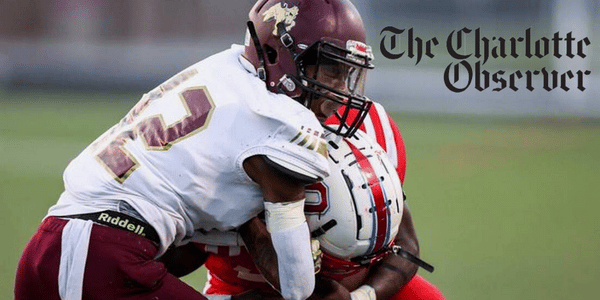The Truth About Verbal Commitments
Updated on Aug 8, 2023

The first step in the commitment process occurs when a college coach gives a verbal offer of a roster spot (with or without a scholarship attached) to a student-athlete – not in writing and without a signature. The student-athlete then accepts the coach’s offer and makes a verbal commitment in response to the coach. This important step in the commitment process is typically done outside of the National Letter of Intent (NLI) signing date.
While an NLI is a binding contract between the recruit and the college or university, a verbal commitment is a non-binding agreement between coach and player. Since it is non-binding, a verbal commitment can be broken or taken back at any time by either the coach or the player. Read “What It Means to Commit to a School” to learn what student-athletes need to know before, during, and after signing their NLI.
How Do You Verbally Commit to a College?
Once a college coach makes a verbal offer, a student-athlete can accept the offer and make a verbal commitment over the phone or in-person.
It is common for students to post their verbal offers on social media, which can sometimes result in more offers. Once the verbal commitment has been made, posting on social media can send the message to other coaches that they should stop recruiting you.
Don’t worry if the coach or program doesn’t celebrate the commitment with you on social media – NCAA rules prohibit colleges and coaches from commenting publicly about verbal commitments. Colleges must wait until both an NLI and an athletic grant-in-aid agreement (athletic scholarship) have been signed by the student-athlete before making a public announcements, such as naming the recruit on the program’s social media or on their website.
Honest Insight: Posting an offer that you don’t accept could rub certain coaches the wrong way. Remember the coaching world is small, and it’s important to maintain good relationships. Think ahead of when they could recruit you in the future as a transfer student or even hire you someday as an assistant.
When Can You Verbally Commit to a College?
Student-athletes can verbally commit to a college at any time, regardless of their age or high school graduation year! Coaches can relay a verbal offer to a recruit as soon as they can speak to the student in person or over the phone. While recruiting contact periods will vary based on the sport played and graduation year, most verbal offers to recruits happen during their sophomore or junior year of high school. Oftentimes when you hear of a student verbally committing before they are allowed to talk to college coaches, it usually happens via an intermediary adult, such as a club or high school coach.
Three Things to Consider Before Verbally Committing to a School
For a student who has a definite first-choice college, verbally committing has many benefits; however there are three main points to consider to before accepting the verbal offer:
- Timing – Verbal offers are given on a timeline and can expire. The first recruit to respond might in fact win the spot on the team, with those that wait too long losing their offer. Also, the needs of the team (or the playing conference) may change between when the verbal offer was made, and when it will become final.
- Looking Beyond Sport – While a verbal commitment is between a coach and recruit, it is important to keep in mind that you’ll be attending college as a student… on top of being an athlete. Is the school the right academic fit for you? Does it seem like a place you want to be for at least four years? Do you like the team and share common interests? It is important to ask questions with the school’s Academic Counselor, similarly to asking a college coach about their program. Review Honest Game’s blog about what to ask on recruiting visits for more insight into the types of questions to explore before making your commitment.
- Transparency – Coaches will continue to recruit until they fill their roster and will sometimes offer more spots than they have. That verbal commitment you received could have been made to 10 students for 2 roster spots. Be sure to ask when the commitment will “be final” when communicating with the coach.
What to Do After Verbally Committing to a School?
A lot can happen between the time a coach verbally offers a spot on the roster and when you can actually “commit” to a school by signing an NLI. Make sure you continue communicating with the college coach!
With the creation of the NCAA Transfer Portal and the recent rule changes of the one-time transfer exception, college rosters fluctuate at a high rate depending on the needs of the program. Sometimes the position the coach first needed to fill has been filled with an experienced transfer student.
In addition to staying in contact with college coaches, be sure you are continuing to stay active, playing competitively and working on your game!
If your initial verbal commitment falls through, you will want other coaches that you are continuing to work hard and grow your skillset as a player. “Late commitments” happen frequently and coaches that previously recruited you may suddenly have a roster spot available.
Common Questions About Verbal Commitments
Can You Verbally Commit to More Than One College?
It’s strongly recommended to not verbally commit to more than one school. The coaching world is small and committing to more than one college could end up backfiring. You should be open and honest in your recruiting process. If you are unsure if you want to attend a specific school, do not verbally commit.
Can You “De-Commit” go a School?
Unlike signing a binding NLI agreement, you are able to back out of a verbal commitment if you change your mind. But be very careful about de-committing – you don’t want to get a reputation for being dishonest or unreliable. Again make sure to be open and honest with the college coach and if you feel you have found a better situation, athletically, academically (or both), tell the coach right away. Remember… verbal commitments go both ways and a college coach is able to rescind their offer as well.
What Happens If You Verbally Commit to a Coach and They Don’t Accept Your Commitment?
In the event that the needs of the team have changed since the initial verbal offer was made, the coach may not accept your commitment and you will need to refocus on your list of options. Revisit your list of potential schools and re-evaluate the options that still exist for you to play college sports. Follow up with the coaches to inquire if their initial playing offer still stands. from your initial list of schools and inquire if there is still an offer to play for them. Refocus on your other options.
Can an Injury Impact My Verbal Commitment?
Unfortunately yes, an injury can impact a verbal commitment if the coach does not think you will be able to contribute to the team in the same way. However, many students are able to rebound successfully from their injury, which demonstrates hard work and dedication to a coach. Students coming out of injury often commit later and become “late signees”.
What Happens to a Verbal Commitment If There are Coaching Staff Changes?
A coaching change can break existing verbal commitments and the new coach is not required to honor any previous offer made by the old coach. In some cases, new coaches may completely wipe the existing recruiting slate clean if they would like to go in a different direction. Learn more about one student-athlete’s journey that experienced a similar scenario and ended up entering the NCAA Transfer Portal.
Honest Insight: When a coach makes a verbal offer to a recruit and then takes a new job, their communication and relationship may continue and the recruit could be recruited to the coach’s new school.
Once a student-athlete signs their NLI, changes to the coaching staff do not void the agreement, as an NLI is a binding two-way commitment between the college and the student, and is not tied to the coaching staff.
Have more questions about the college commitment process? Honest Game Counselors are available to provide one-on-one assistance to support student-athletes in navigating post-secondary opportunities athletically and academically. Schedule a time to meet virtually with our experts.

As a former Senior Associate Athletic Director at the NCAA Division I level and with more than 20 years of experience in collegiate athletics, Courtney has advised thousands of student-athletes through the college recruiting and eligibility process for college sports. Interested in virtual counseling with Courtney? Sign up here.



